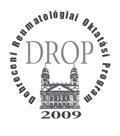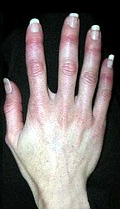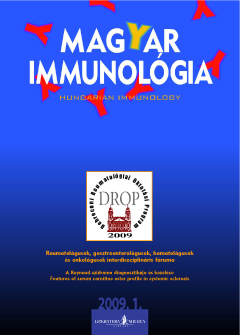The eLitMed.hu medical portal uses computer cookies for convenient operation. Detailed information can be found in the Cookie-policy.
Hungarian Immunology - 2009;8(01)
Content
[Features of serum carnitine ester profile in systemic sclerosis]
[AIMS - Systemic sclerosis (SSc) is an autoimmune disease characterized by vascular abnormalities, fibrosis, inflammatory changes, and late stage atrophy with obliterative vasculopathy. Clinically it has two distinct subtypes, limited (lcSSc) and diffuse cutaneous systemic sclerosis (dcSSc). Carnitine is an essential metabolite with ester forming capability. We investigated the possible relationship between carnitine metabolism and systemic sclerosis, stratified by disease subgroups. PATIENTS AND METHODS - We performed comparative measurements of carnitine profile in 107 systemic sclerosis patients (78 lcSSc and 29 dcSSc) and 47 healthy controls using triple quadrupol ESI mass spectrometry. RESULTS - C2-, C3-, C8-, C10:1- and C10-carnitine ester levels were moderately decreased in the serum of the patients, while C5- and C6-carnitine ester concentrations increased in both types of the disease compared with controls; as a summary, these changes altogether led to reduced total carnitine ester concentrations. Free carnitine level remained unaffected. CONCLUSIONS - These results show that both types of SSc have a moderate influence on shortand medium chain carnitine ester metabolism, but likely do not affect the quantity of the free carnitine reserves.]
1.
Clinical Neuroscience
[Headache registry in Szeged: Experiences regarding to migraine patients]2.
Clinical Neuroscience
[The new target population of stroke awareness campaign: Kindergarten students ]3.
Clinical Neuroscience
Is there any difference in mortality rates of atrial fibrillation detected before or after ischemic stroke?4.
Clinical Neuroscience
Factors influencing the level of stigma in Parkinson’s disease in western Turkey5.
Clinical Neuroscience
[The effects of demographic and clinical factors on the severity of poststroke aphasia]1.
2.
Clinical Oncology
[Pancreatic cancer: ESMO Clinical Practice Guideline for diagnosis, treatment and follow-up]3.
Clinical Oncology
[Pharmacovigilance landscape – Lessons from the past and opportunities for future]4.
5.








